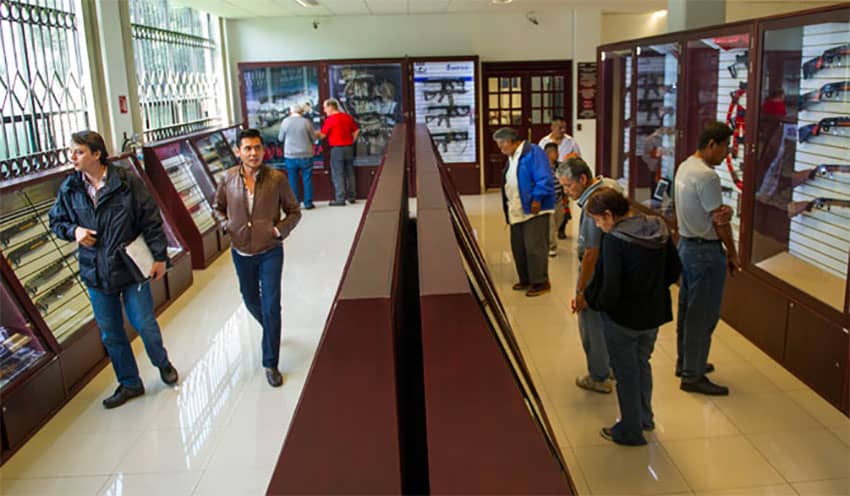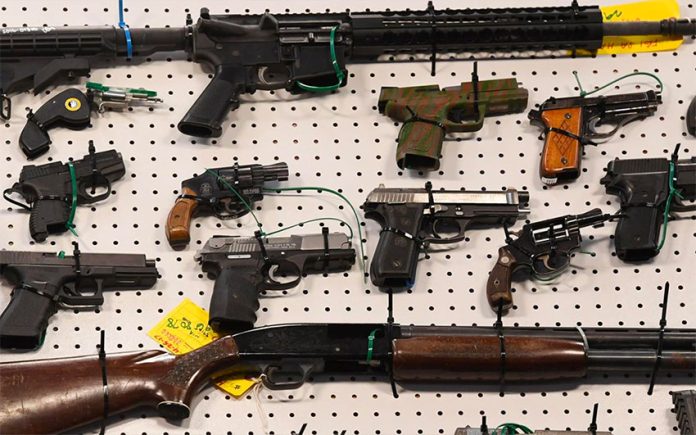Gun ownership is on the rise in Mexico as more and more people buy firearms to protect themselves amid the high levels of violent crime that plague much of the country.
The number of guns purchased legally and illegally by citizens with no links to drug trafficking or organized crime rose 33% in 2018 to 352,000, according to a study by Carlos Pérez Ricart, a researcher at the Center for Research and Teaching in Economics in Mexico City.
(Guns can only be purchased legally in Mexico at one store operated by the army in Mexico City but are widely available on the black market.)
Entitled Acquisition of Weapons in Mexico 2012-18: Findings of the National Survey on Crime Victims in Mexico, the study also found that there were firearms in at least 1.89 million Mexican homes, a figure that represents 5.5% of all households in the country.
“If we assume that the average number of people living in a house is 3.6, … we can infer that at least 6.8 million people had access to firearms from the comfort of their homes,” Pérez told the newspaper Milenio.
The academic said that the number of Mexicans with access to guns is probably higher because many survey respondents “don’t acknowledge having guns even though they have them.”
Pérez’s study found that the most typical gun owners in Mexico are young men who live in rural areas with high levels of crime.
“The majority of people who buy guns are young men. That’s the opposite to what happens in the United States where it’s old people who buy guns more. In Mexico it’s young men who live in rural places, … areas where there are shootouts or criminal activity,” he said.
Pérez explained that victims of crime, especially those who have lost confidence in the police, are more likely to buy a weapon to protect themselves in the event they are targeted in a future criminal attack.
“We saw that people who have been victims [of crime] tend to be the people who buy weapons. We call this a contagion effect, … if you were already a victim, you’re more inclined to buy guns,” he said.
Pérez also found that many buyers of guns are people with high levels of education and high incomes.

“That’s a little bit counterintuitive. We had thought that it was people with lower incomes and less education buying guns …”
The academic added that people who already have a gun or guns in their home are likely to add to their collection.
“There is a phenomenon like that in the United States, where a large percentage of guns in private hands are concentrated in [the hands of] few people. … We think that the same thing happens in Mexico,” Pérez said.
However, having guns at home doesn’t make people safer, the researcher said, explaining that confronting an intruder with a firearm significantly increases the probability of a person who lives in the home being wounded or killed.
Despite that finding, a 62-year-old resident of Ecatepec, México state – a municipality that is notorious for crime – told Milenio that having access to two guns at his home gives him confidence that he can protect his family in the event of a home invasion.
Marcos (not his real name) bought two hand guns in 2017 after his home was burgled while he and his family were on vacation.
“We live in a neighborhood where the police are conspicuous by their absence. Luckily the burglary occurred when we weren’t at home but if we had been what would I have defended my family with? That’s why I bought two pistols and taught my daughters to shoot,” he said.
Marcos said that he bought the two guns for 9,500 pesos (US $460) from a colleague at work, meaning that they were illegally acquired. Neither weapon is registered with the Ministry of National Defense, as occurs when guns are bought at the army gun store.
The increase in the purchase of weapons, especially illegally, is “very dangerous,” Pérez said, adding that authorities need to do a better job at regulating gun ownership.
Making that job difficult is the steady stream of weapons that flow illegally into Mexico from the United States, many of which go to drug cartels or are sold on the black market.
The Ministry of Foreign Affairs said in 2019 that more than more than 200,000 guns are smuggled into Mexico every year. It also said that firearms from the United States are used in seven out of every 10 high-impact crimes.
The illegal cross border arms trade has long been a contentious issue between Mexico and the United States, and each country claims to have recently offered the other advice about how to combat it only to be ignored.
Just days before he left the post in January, former United States ambassador to Mexico Christopher Landau claimed that the Mexican government rejected a U.S. offer of equipment to help control illegal arms trafficking.
Fabián Medina, Foreign Minister Marcelo Ebrard’s chief of staff, refuted that claim in early February and portrayed the United States, not Mexico, as being uncooperative on the arms trafficking issue.
He accused Landua of being a liar and asserted that the United States didn’t respond to a request for it to carry out operations on its side of the border to inspect vehicles coming to Mexico.
Source: Milenio (sp)
